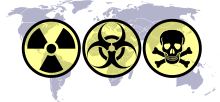Beginning in the mid-1930s, Japan conducted numerous attempts to acquire and develop weapons of mass destruction. The 1943 Battle of Changde saw Japanese use of both bioweapons and chemical weapons, and the Japanese conducted a serious, though futile, nuclear weapon program.
Since World War II, the United States military based nuclear and chemical weapons and field tested biological anti-crop weapons in Japan.
Japan has since become a nuclear-capable state, said to be a "screwdriver's turn" away from nuclear weapons; having the capacity, the know-how, and the materials to make a nuclear bomb. Japan has consistently eschewed any desire to have nuclear weapons, and no mainstream Japanese party has ever advocated acquisition of nuclear weapons or any weapons of mass destruction. There are controversies on whether such weapons are forbidden by the Japanese constitution or not. Japan has signed many treaties prohibiting these kinds of weapons.
Japan is the only nation that has been attacked with atomic weapons. Prior to 1946 Japan carried out many attacks using weapons of mass destruction (chemical and biological), principally in China. In 1995, members of the Japanese religious cult Aum Shinrikiyo released chemical weapons in Tokyo in a domestic terror attack.
